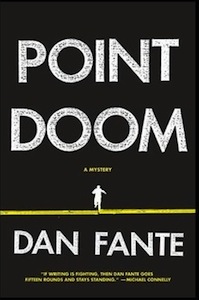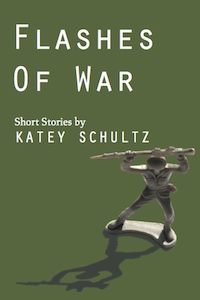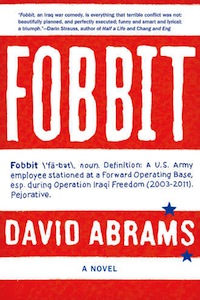TOM LUTZ reviews POINT DOOM by DAN FANTE

Dan Fante's Point Doom is classic L.A. noir, but it is also a serial-killer thriller, with Girl with the Dragon Tattoo-level violence and splatter, maybe even more. Many detectives in noir are defrocked cops; Fante one-ups that and makes his protagonist, J.D. Fiorella, who bears a not-superficial resemblance to Fante himself, an ex-private investigator who has drunk his way out of his license. Now sober, Fiorella refuses to get pushed around, and lots of people try. (Fante's last book was a memoir of his father, the legendary John Fante.) [Interview with Fante here.]
¤
DUFF BRENNA reviews FLASHES OF WAR by KATEY SCHULTZ

Flashes of War: Short Stories, Apprentice House, May 13, 2013, 200 pp.
THE TITLE OF THE FIRST STORY in Schultz’s collection, “While the Rest of America Is at the Mall,” echoes a quote from a YouTube video, wherein embedded reporter Ben Anderson is interviewing a soldier in Iraq. The soldier looks into the camera and says, “America’s not at war. America is at the mall.” Rarely has a comment about the last decade of America’s two wars hit home with such ironic force.
Schultz begins the story in media res: “It’s not quite sniper fire, but it isn’t random either.” While America is at the mall, a Navy SEAL is treading water in a river as bullets rain “like a Carolina downpour.” The story is flash fiction, hardly more than one page long. From its position as seen through American eyes, Schultz pivots the point of view in the next story in order to see the war through the eyes of an Afghan woman in Kabul. The woman explains how her burqa makes the world more tolerable. Without the burqa she says, "the sun is so bright that when I walk it feels like swimming through sticky yellow air.” Images follow which reveal the carnage of war. An undetonated missile “sleeps like a gigantic baby” in the woman’s garden. Her father is dead. Everywhere there are craters and rubble, a brick wall around her home is gone, and even the tools for repairing the wall have been looted.
The author pivots again in the next story, looking through the eyes of an American soldier “Home on Leave” and trying to adjust. He is partying with his brother, enjoying himself, only to find that the war is at the party too — in the form of a veteran who lost a leg and has turned into a foul-mouthed bully and drug pusher.
There are descriptive gems page after page: “I left one elbow and my entire left hand in the middle of a filleted Humvee …” “I tried to get up and go back inside but my legs felt like sandbags.” [He was] “almost normal looking if the angle is right …” “Once, I watched an old mutt nibble on a dead Afghan’s wounds and nose into his flesh rabid with hunger. The dog appeared embarrassed and lost, like a fallen dictator pillaging the remains of his own village.”
Back and forth it goes, one side, then the other. Up stories. Down stories. Heartbreaking one moment, triumph the next. Stories filled with an immense humanity, all, together, detailing the trivia, the nonsense, the rudiments and the essentials. The nuts and bolts of war, its lifeblood, its jargon, its maddening absurdities and heroisms and senseless deaths and maimings are laid out in a clear, clean, rhythmic tessellation, united with a deceptively minimalist style that out-Carvers Carver and exposes the traumas of war without any breast-beating outrage. But outrage is what one feels. Outrage and exasperation, as well as a sense of satisfaction at Schultz’s adept achievement. Flashes of War is her first published book. The stories are so accomplished, so professional that one thinks them written by a well-seasoned writer, a brilliant old stager with a list of publications as long as your arm. Can she top herself? Given the evidence so far, it seems certain she will.
¤
TOM LUTZ reviews FOBBIT by DAVID ABRAMS

Grove Press, September 2012, 384 pp.
DAVID ABRAMS spent 20 years as an active-duty Army journalist, and in 2005-2006 he was in Baghdad; his notebooks from that year informed his first novel Fobbit (2012). Fobbit came burdened with comparisons to Joseph Heller’s Catch-22, which would be enough to sink just about any novel. It ended up on a raft of 'best of 2012' lists. This novel is not Catch-22, and it isn’t Slaughterhouse Five or M*A*S*H, the other touchstone texts for blurbers and reviewers, but it maintains a sophisticated comic gloss, and it never forgets the horror. It may, in some ways, be more successful than these other black comedies at representing the workaday reality of war, and its relative contemporaneity (Catch-22 was published 16 years after the end of the war, Slaughterhouse Five 24 years after) lends it tremendous emotional force.
¤
LARB Contributor
Did you know LARB is a reader-supported nonprofit?
LARB publishes daily without a paywall as part of our mission to make rigorous, incisive, and engaging writing on every aspect of literature, culture, and the arts freely accessible to the public. Help us continue this work with your tax-deductible donation today!
:quality(75)/https%3A%2F%2Fdev.lareviewofbooks.org%2Fwp-content%2Fuploads%2F2013%2F07%2F1374297939.jpg)